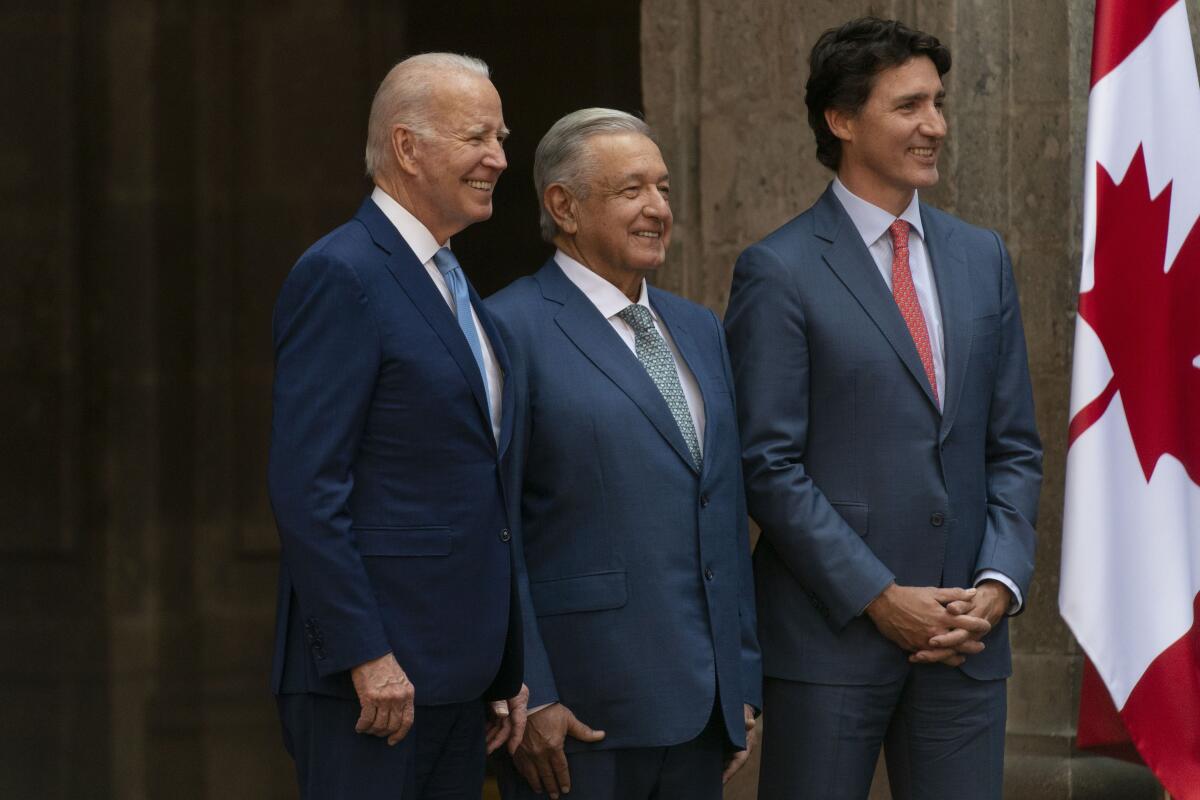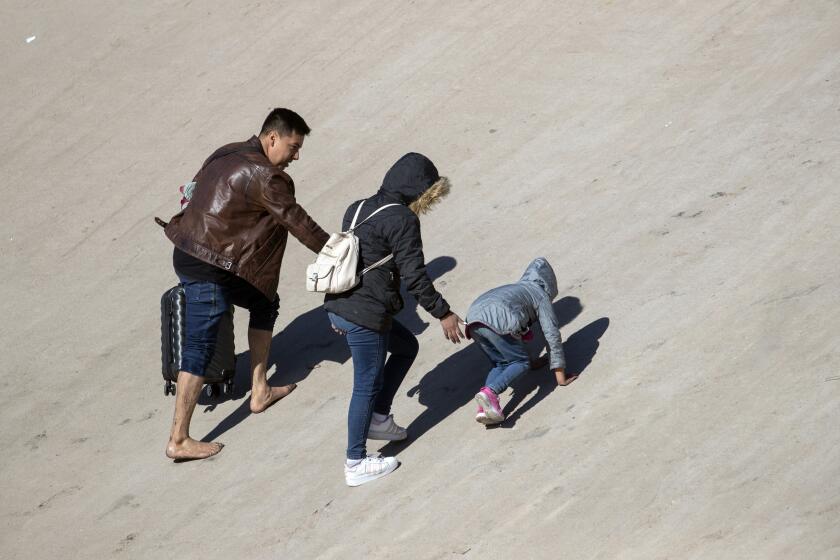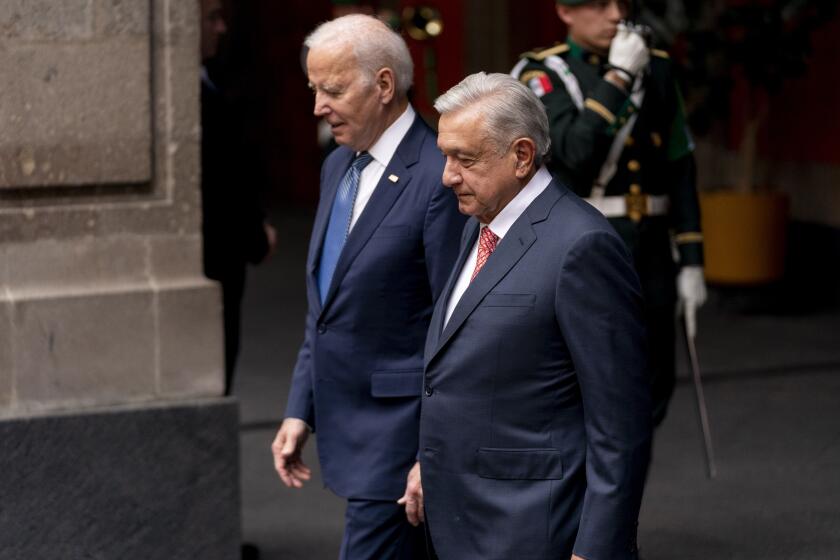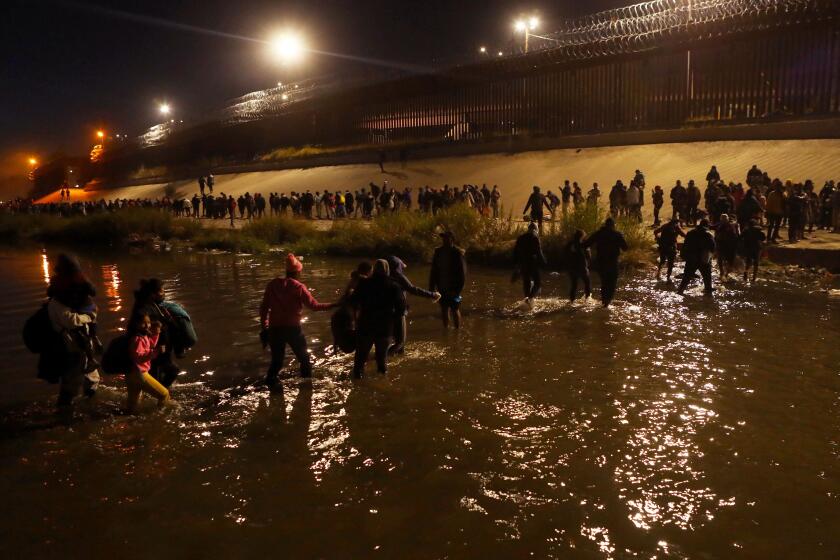U.S.-Mexico-Canada summit deals lean toward symbolism, not substance

WASHINGTON — President Biden, Mexican counterpart Andrés Manuel López Obrador and Canadian Prime Minister Justin Trudeau unveiled a series of new commitments Tuesday designed to show regional cooperation on trade, migration and energy.
The commitments, however, appeared to be more symbolic than substantive.
At the North American Leaders’ Summit in Mexico City, the three leaders agreed to organize a meeting of government and industry officials to discuss how to manufacture more semiconductors on the continent. They vowed to reduce methane emissions from the solid waste and wastewater sector by at least 15% by 2030 compared with 2020 levels. And they promised to devise a plan to install electric vehicle chargers along their international borders.
The most significant deal involving the countries, in which Mexico agreed to readmit up to 30,000 migrants per month from Cuba, Haiti, Nicaragua and Venezuela who are turned away at the U.S. border, was announced days before the summit began.
A White House fact sheet distributed ahead of the three-way meeting offered few details on how the three nations planned to implement the new actions.
The plan calls for expelling more migrants without considering their asylum claims; expanding avenues for Nicaraguans, Haitians and Cubans to enter.
In a ceremony full of pomp and pageantry at Mexico City’s National Palace, the leaders and their spouses sought to show unity as they hugged and posed for photos. But the two-day talks instead demonstrated that the trilateral relationship remains hobbled by trade and energy disputes as the three leaders prioritize their domestic political agendas over regional cooperation.
The countries’ disputes over trade and energy are serious and long-standing.
The U.S. and Canada have accused López Obrador of violating the three countries’ joint trade deal by pushing policies that favor Mexico’s state oil company and its national electricity utility. They have also complained that the Mexican president has not embraced their climate change goals. López Obrador has reactivated coal plants, halted renewable energy projects, spent billions building a state-owned oil refinery and has pushed legislation that would require Mexico’s electric company to take more power from state-run plants, which are fueled largely by crude oil and coal.
Mexico and Canada, meanwhile, have accused the U.S. of a strict interpretation of the pact’s automotive trade rules that make it more difficult for cars manufactured in those two countries to be considered duty-free in the U.S. A panel set up under the 2020 U.S.-Mexico-Canada agreement is expected to issue a decision Thursday on the dispute. Biden has further rankled the two neighboring leaders by pushing “Buy American” policies and emphasizing domestic manufacturing.
Regional pressures on tackling record migration also spilled into public view during Biden’s meeting with López Obrador, who accused the U.S. of harboring a “disdain toward Latin America and the Caribbean.”
Biden met Mexico’s leader for an at-times testy summit amid concerns over illegal immigration, fentanyl and guns. Canada’s Trudeau joins them Tuesday.
“It’s been two days full of symbolism and gestures of friendship and unity, but enormous differences on policy,” said Mariana Campero, former chief executive of the Mexican Council on Foreign Relations and host of the Center for Strategic and International Studies podcast “Mexico Matters.”
Amid the rising tensions, the leaders sought to highlight areas of cooperation. At a news conference after the meeting, Biden said the leaders’ priority was keeping North America as the “most competitive, prosperous and resilient” economic region in the world.
“We’re true partners, the three of us,” Biden said after a two-hour meeting with his counterparts. “There can no longer be any question — none — in today’s interconnected world: We cannot wall ourselves off from shared problems.”
López Obrador praised Biden as “the first president of the United States in a very long time who has not built ... even one meter of wall.”
“We appreciate that even if the conservatives do not like it,” he added.
As President Biden visits El Paso, thousands of people who fled oppressive countries are marooned in Mexico in the wake of his expansion of a Trump-era policy.
In their one-on-one meeting, Biden and Trudeau expressed concerns over the riots in Brazil and spoke of shared goals on climate, Haiti and Ukraine. Biden said there is “unlimited economic potential” when their nations work together.
Before the summit, Biden unveiled a major shift in his immigration policy as his administration struggles to deal with a record surge of migrants crossing the southern U.S. border illegally. Under the new rules, which expand the use of a Trump-era policy that allows border agents to immediately expel migrants, Mexico has agreed to take in 30,000 migrants per month from Cuba, Haiti, Nicaragua and Venezuela. López Obrador on Monday signaled he would be open to accepting more than 30,000 migrants per month.
Biden acknowledged the “strain” that the migrant influx has put on communities in Mexico and the United States.
“We’re working together to address this challenge in a way that upholds our nation’s laws and protects human rights of migrants facing desperate circumstances,” the president said.
The leaders agreed to share “best practices” to help migrants find legal pathways and access the asylum process through a new virtual platform.
Progress on the three countries’ economic agreements is also far from certain. Any efforts to boost regional semiconductor manufacturing and bring other industries back to North America will hinge on whether Mexico realigns its energy policies with those of the U.S. and Canada, said Arturo Sarukhan, a former Mexican ambassador to the United States.
The three countries also announced plans to coordinate a strategy to crack down on weapons and drug trafficking. U.S. authorities would like to see Mexico do more to target clandestine drug labs and clamp down on the chemicals used to manufacture the synthentic opioid fentanyl. Mexico has long called on Washington to curb the flow of guns across the border as it grapples with an increase in gun-related homicides.
Cooperation on law enforcement has been a point of contention since the 2020 arrest of retired Gen. Salvador Cienfuegos, Mexico’s defense minister from 2012 to 2018, at Los Angeles International Airport. The U.S. dropped the charges after López Obrador threatened to withhold security cooperation.
Mexico appeared to have renewed cooperation on drug trafficking last week, when authorities recaptured Ovidio Guzmán, a son of imprisoned drug lord Joaquín “El Chapo” Guzmán.
Times staff writers Patrick J. McDonnell and Kate Linthicum in Mexico City contributed to this report.
More to Read
Get the L.A. Times Politics newsletter
Deeply reported insights into legislation, politics and policy from Sacramento, Washington and beyond. In your inbox three times per week.
You may occasionally receive promotional content from the Los Angeles Times.














